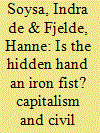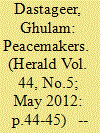| Srl | Item |
| 1 |
ID:
097767


|
|
|
|
|
| Publication |
2010.
|
| Summary/Abstract |
There is surprisingly little empirical scholarship on the spread of capitalistic economic policies under the rubric of 'globalization' and domestic peace. While the classical liberals saw free markets leading to social harmony because of self-interest of individuals, who cooperate for profit, Marxists and others viewed markets as anarchical, requiring state intervention for obtaining justice and peace. The authors argue from an opportunity-cost perspective that the payoffs to rebellion are structured by how an economy is governed. Closed economies are likelier than more open ones to accumulate 'rebellion specific capital' because of high payoffs to organization in the shadows. Using an index of economic freedom that measures how free people are to transact in an economy, the authors find that countries more favorable to free enterprise have a reduced risk of civil war onsets, a result that is robust to the inclusion of institutional quality, per capita wealth, and sundry controls. The results hold up despite a battery of specification changes, alternative data, and testing methods. The findings do not suggest that states under conditions of capitalism lose their autonomy to provide the public good of peace, as skeptics of globalization claim. Peacemakers will do well to build institutions that reward productive investment over rent-seeking, alongside democratic institutions that ultimately gain their legitimacy on the back of good economic performance and well-functioning markets.
|
|
|
|
|
|
|
|
|
|
|
|
|
|
|
|
| 2 |
ID:
113628


|
|
|
| 3 |
ID:
090810


|
|
|
|
|
| Publication |
2009.
|
| Summary/Abstract |
This paper focuses on powerful third parties whose interests in a conflict are closely aligned with a single disputant's interests. I show that such third-party bias reveals private information about an intervener's willingness to secure an agreement using force. When a highly biased power intervenes in a crisis, a peaceful settlement is likely because warring parties are certain the third party will enforce an agreement by military means. When an intervener shows less favoritism, negotiations tend to fail because the disputants doubt that it is committed to use force. Peace is again more likely when the third party is unbiased because such a party behaves as a mediator, seeking agreements both adversaries find acceptable. These findings, coupled with evidence from U.S. and British interventions in the Balkans, suggest a possible explanation for why major power intervention can bring about drastically different outcomes.
|
|
|
|
|
|
|
|
|
|
|
|
|
|
|
|